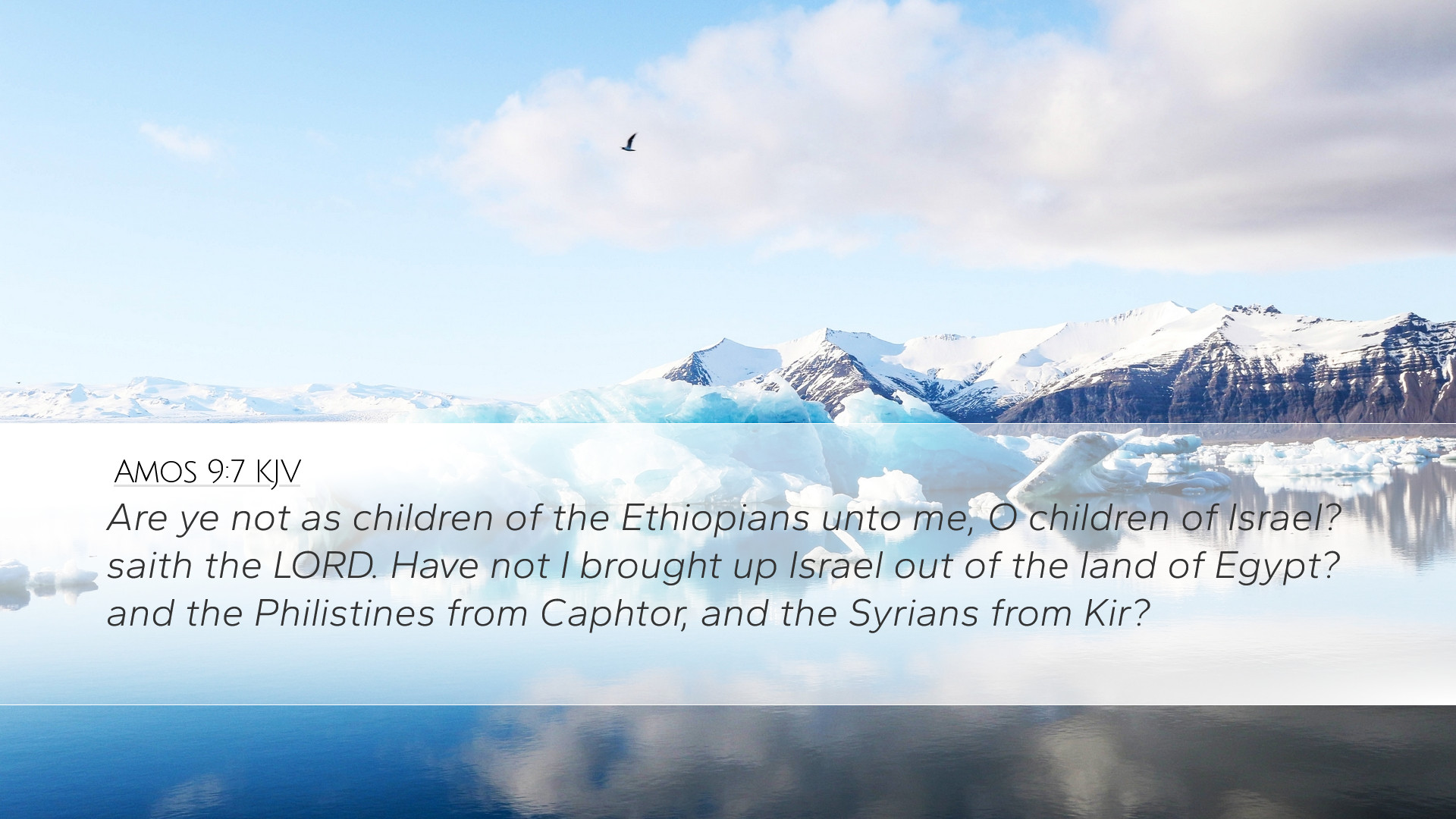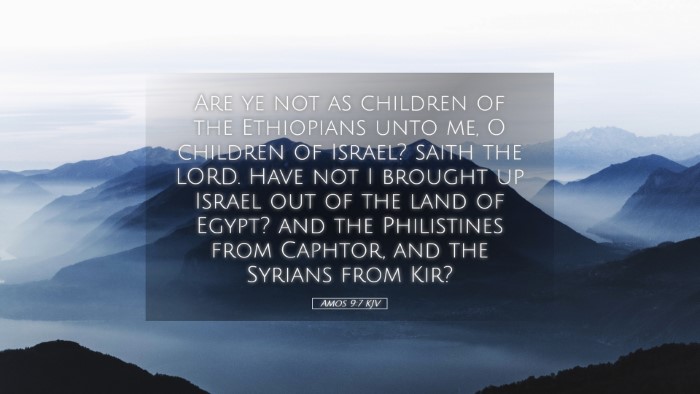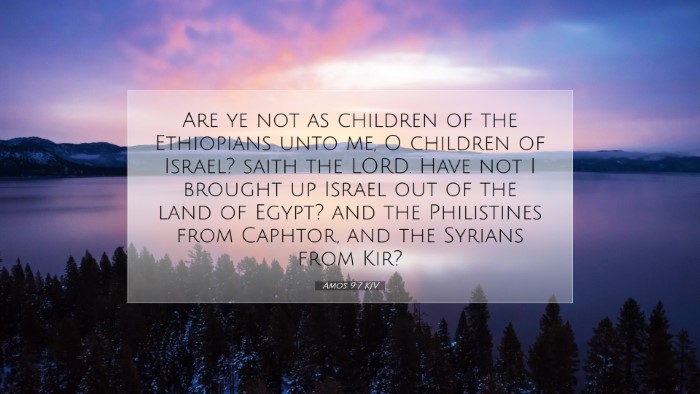Old Testament
Genesis Exodus Leviticus Numbers Deuteronomy Joshua Judges Ruth 1 Samuel 2 Samuel 1 Kings 2 Kings 1 Chronicles 2 Chronicles Ezra Nehemiah Esther Job Psalms Proverbs Ecclesiastes Song of Solomon Isaiah Jeremiah Lamentations Ezekiel Daniel Hosea Joel Amos Obadiah Jonah Micah Nahum Habakkuk Zephaniah Haggai Zechariah MalachiAmos 9:7
Amos 9:7 KJV
Are ye not as children of the Ethiopians unto me, O children of Israel? saith the LORD. Have not I brought up Israel out of the land of Egypt? and the Philistines from Caphtor, and the Syrians from Kir?
Amos 9:7 Bible Commentary
Commentary on Amos 9:7
Amos 9:7 states: "Are ye not as children of the Ethiopians unto me, O children of Israel? saith the LORD. Have not I brought up Israel out of the land of Egypt? and the Philistines from Caphtor, and the Syrians from Kir?"
This verse occurs within the prophetic context where Amos addresses the people of Israel, affirming God's sovereignty and judgment as well as His historical actions regarding their deliverance and the surrounding nations.
Contextual Analysis
In the broader context of the Book of Amos, the prophet delivers a message of impending judgment against Israel due to their sins, particularly social injustices and idolatry. Within these judgments, Amos emphasizes the uniqueness of Israel's relationship with God, who chose them out of all nations.
Theological Insights
- Divine Sovereignty: The assertion that Israel is no different from the Ethiopians highlights a fundamental theological truth about God's sovereignty over all nations. Amos uses this rhetorical question to illustrate that God's choice is not based on ethnicity or merit, but solely on His will.
- Historical Redemption: The mention of God's past acts of deliverance—bringing Israel out of Egypt—reminds the audience of their covenantal history. It illustrates a crucial aspect of Israel's identity and the responsibilities that come with being chosen by God.
- Inclusivity of God's Plan: Addressing the shift from Israel to the nations serves to remind the audience that God's plan encompasses all peoples, suggesting a future where blessing would extend beyond Israel to the surrounding nations.
Insights from Matthew Henry
Matthew Henry explains that Amos seeks to demonstrate that God’s favor cannot be taken for granted. He draws a parallel between Israel and the Ethiopians to remind the Israelites that their privileged status is due to God's grace. If they fail to uphold their covenantal responsibilities, they risk facing the same judgments as other nations.
Henry emphasizes that God’s judgments are not arbitrary. The historical acts of salvation—such as the Exodus—should compel Israel to consider their relationship with God seriously. Just as He delivered them, He can also choose to cast them aside unless they return to righteousness.
Insights from Albert Barnes
Albert Barnes comments about the rhetorical nature of Amos’ question. By juxtaposing the Israelites with the Ethiopians, Barnes suggests that Amos is making a profound statement regarding God’s view of nations. He profoundly implies that Israel’s spiritual state is such that they are not exempt from divine scrutiny simply because of their heritage.
Barnes also highlights the importance of remembering God's past deeds. This remembrance should foster humility and commitment among the Israelites. If God has acted in history to save and restore, then their present behaviors must reflect that transformative grace.
Insights from Adam Clarke
Adam Clarke provides a deeper linguistic and cultural understanding of the terms used in Amos 9:7. He notes that 'children of the Ethiopians' refers not just to the ethnic group but encapsulates a broader understanding of nations who are outside the covenant. Clarke emphasizes that while Israel is chosen, they must respond to God’s love and leading diligently.
Clarke further elaborates on the graduation of God's saving acts. He contrasts the deliverance of Israel with that of other nations, pointing out that the remembrances of God’s deliverance should build a deeper connection to their God. His argument rests on the notion that neglecting God's role in their history could lead to spiritual desolation.
Conclusion
Amos 9:7 serves as a poignant reminder for believers today of the nature of God's sovereignty and the inclusive purpose behind His redemptive plan. The interaction highlighted by Amos emphasizes that status before God is not based on ethnic identity but on faithfulness and righteousness.
The rich theological insights gathered from Matthew Henry, Albert Barnes, and Adam Clarke urge contemporary readers to reflect deeply upon God’s past actions in their lives while remaining vigilant in fulfilling their covenant responsibilities. The challenges Israel faced serve not merely as historical lessons but as reminders of the enduring nature of God’s relationship with His people.


